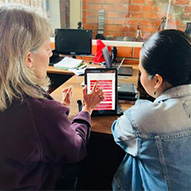Certificate Programs
Overview
- Complete in 12 – 18 months
- Starts in August of each year
- Requires 15 total credit hours to complete
- Courses are in-person
Eligibility
- A bachelor’s degree is required.
- Certification is only available for non-degree seeking students.
- UT Southwestern does not sponsor F-1 student visas for non-degree seeking/certificate students.
Graduate Certificate Programs
Students delve deeper into public health and clinical and translational research topics through our unique non-degree certificate programs. Whether you are new to the field or seeking to sharpen your skills in these concrete areas, our one-year certificate programs can help you take the next step in your public health and research careers.
After completing our Certificate Program, participants may choose to continue their education in a graduate degree program at the O’Donnell School of Public Health. Interested candidates must apply and receive admission to the graduate program. Admitted students with a certificate may be eligible to apply some certificate semester credit hours toward their degree.

Graduate Certificate of Public Health
The Certificate in Public Health program equips students with introductory skills and knowledge to tackle contemporary health challenges. Through rigorous coursework, students delve into areas such as epidemiology, health system science, biostatistics and programming, and health promotion and equity. This program can serve as a steppingstone for further education, such as a Master's in Public Health, providing foundational knowledge that can enhance further academic pursuits.
Graduates will learn:
- Strategies for disease prevention and health promotion.
- Skills to identify public health trends and patterns.
- How to navigate interdisciplinary teams and advocate for evidence-based public health policies.
- How to respond adeptly to the dynamic landscape of public health, addressing emerging threats with expertise and innovation.
- Coursework
15 Credits
- Theoretical Foundations of Health Promotion - 3 credit hours
- Social Determination of Health - 3 credit hours
- Introduction to Health Systems - 3 credit hours
- Introduction to Epidemiology - 3 credit hours
- Introduction to Biostatistics - 3 credit hours

Geospatial Public Health Certificate
As geospatial technologies become ever more integral to public health research and evidence-based decision-making, there is a growing demand for professionals with the knowledge and expertise to bridge the gap between spatial data analysis and practical and effective public health. This certificate equips students with the cutting-edge skills and expertise to address complex public health challenges through the powerful integration of geospatial technologies including geographic information systems (GIS) and remote sensing, with spatial epidemiology, environmental health, and spatial modeling.
Graduates will learn:
- How to use GIS and related technologies with public health data
- Core tenets of spatial epidemiology and spatiotemporal modeling
- Cartographic design principles and effective visual data communication practices
- Strategies to study emerging infectious diseases using geospatial tools and the One Health framework
- Coursework
15 Credits
- GIS Applications in Public Health, 3 credit hours
- Introduction to Biostatistics and Programming, 4 credit hours
- Cartography and Data Visualization, 2 credit hours
- One Health and Emerging Infectious Diseases, 3 credit hours
- Advanced Geospatial Methods in Public Health, 3 credit hours

Health Care and Public Health Quality Improvement Certificate
Clinical, public health, and community organizations seek to provide care that leads to optimal patient-client centered outcomes while effectively utilizing available resources. This includes examining effectiveness, efficiency, equity, patient centeredness, safety, and timeliness of care and services. The goal of the Certificate in Health Care and Public Health Quality Improvement is to prepare both clinical and nonclinical professionals in health care, public health, and community settings to systematically plan, conduct, and evaluate specific quality improvement projects.
Graduates will learn:
- How to define current quality and workflow
- How to plan and execute quality improvement projects as well as how to define specific quality objectives for improvement projects
- Strategies and tools for implementation of new projects
- How to develop and execute different types of program evaluations
- Coursework
15 Credits
- Quality of Care and Public Health Services, 3 credit hours
- Advanced Quality Improvement Methods, 3 credit hours
- Implementation Science I: Fundamentals, 3 credit hours
- Program and Policy Evaluation, 3 credit hours
Elective Courses (choose one to complete certificate)
- GIS Applications in Public Health, 3 credit hours
- Introduction to Health Promotion, Structure, and Agency, 3 credit hours
- Social Determination of Health, 3 credit hours
- Implementing and Evaluating Health Behavior Interventions, 3 credit hours
- Introduction to Leadership and Management, 3 credit hours
- Introduction to Health Systems Science, 3 credit hours
- Implementation Science II: Design, 3 credit hours
- Introduction to Public Health Data, 3 credit hours

Clinical Investigation Certificate
The Clinical Investigation Certificate provides trainees with the knowledge, skills, and experience necessary to succeed in academic or industry careers in clinical and translational research. This program is intended for individuals trained in the medical sciences or those who have relevant scientific backgrounds and experiences who are seeking to deepen their knowledge of clinical and translational research design and methodology.
Graduates will learn:
- How to plan and conduct their own clinical and translational research
- Biostatistics and biostatistical software programming
- Implementation of clinical research from planning, conduct, to close out
- Basics of manuscript writing and overview of grant funding
- Coursework
15 Credits
Fall- Introduction to Biostatistics & Programming, 4 credit hours
- Clinical Research Design & Analysis, 3 credit hours
- Responsible Conduct of Research, 1 credit hour
Spring
- Socratic Seminar/Clinical & Translational Science Forum, 1 credit hour
- Manuscript Writing, 1 credit hour
- Ethics in Clinical Research, 1 credit hour
- Research Practicum/Directed Research, 4 credit hours
Our programs are based in Dallas, Texas, and you will need to be located in, or willing to relocate to, Dallas by the start of the Fall semester.
Program Leadership
Geospatial Public Health


Quality Improvement

Professor and Director of the Advancing Implementation & Improvement Science Program
Clinical Investigation

Professor of Dermatology
James N. Gilliam, M.D. Chair in Dermatology
Associate Dean Clinical Research Development

